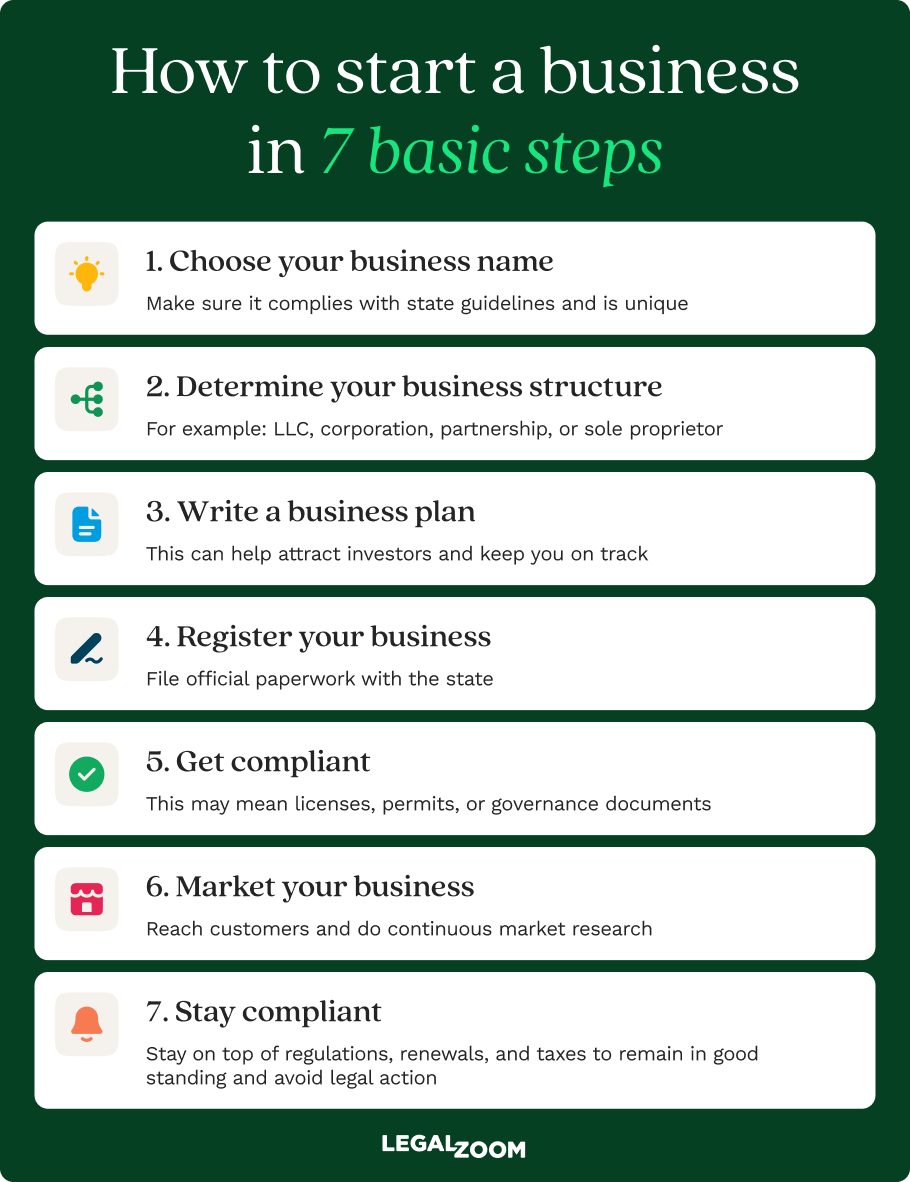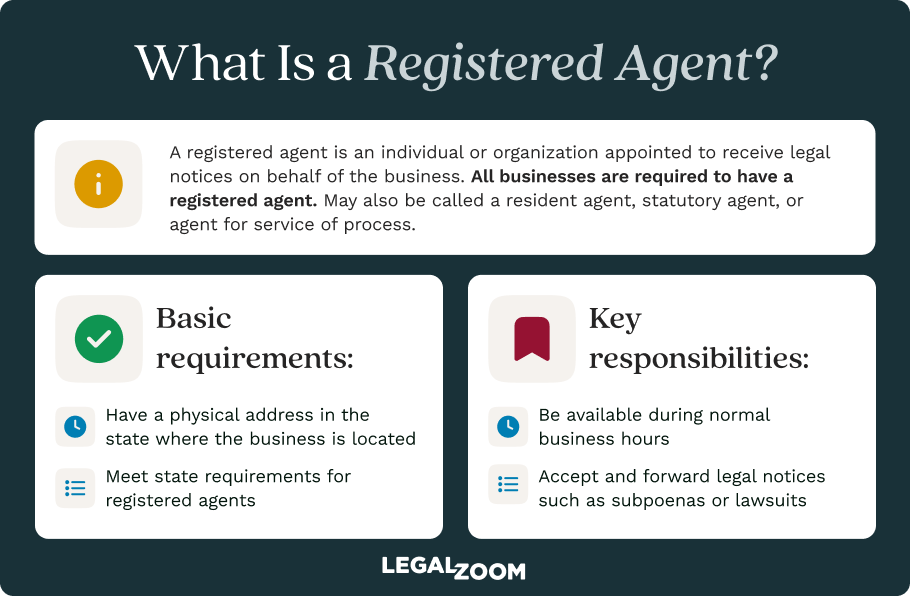If you're looking to open a limited liability company (LLC) in NC, you've picked the right place. North Carolina's robust economy continues to see growth in popular industries like tech, healthcare, and manufacturing, offering a favorable climate for new businesses.
An LLC protects your personal assets and offers flexible tax, management, and operational structures. However, as with other states, North Carolina has some unique LLC requirements. First, you must register with the Secretary of State by filing the necessary forms, paying the necessary fees, and meeting all naming and formation requirements.
What is an LLC and what are its key benefits?
An LLC is a business structure that seeks to protect the owner’s personal assets by separating them from the assets of the LLC. This type of structure is beneficial since it ensures the owner’s personal assets aren’t at risk should the business fall into debt or be involved in a lawsuit.
LLCs are typically subject to pass-through taxation, which means profits and losses are reported on the owner’s personal income tax form, allowing them to avoid the double taxation, unless the LLC elects to be taxed as a corporation. As a business structure, LLCs are also extremely flexible. Owners have a lot of control over how they manage their business and distribute profits, as compared to corporations.
Why choose North Carolina for your LLC?
Besides the state’s robust economic landscape, there are a few reasons why you might choose to form your LLC in the Tar Heel State. For starters, the formation process in North Carolina is relatively simple and may be completed online and the cost for the initial filing is slightly lower than the national average.
The state also does not require entrepreneurs to file an operating agreement as part of the LLC formation process. While an operating agreement is still a good idea, you can skip this step and come back to it later, especially if you’re trying to get up and running with less paperwork.
North Carolina is an attractive place to start a business, especially if you want to keep things simple and close to home. However, there are a few reasons why you might consider forming in another state if you have the flexibility. Most notably, the annual fee for an LLC in North Carolina is $200, which is higher than many other states. North Carolina also does not allow for anonymous LLC filings, which means your personal information will become a part of the public record. If your privacy as a business owner is important to you, you might consider starting your business in a state like Delaware, Wyoming, New Mexico, or Nevada instead.

A step-by-step process for creating an LLC in North Carolina
Before you begin the business registration process for an LLC in North Carolina, it’s important to know the requirements you’ll have to meet. Before you can officially file articles of organization, NC requires you to choose a distinct business name and registered agent. Once you've filed the articles, there are a few other steps to take in the early days to ensure your business stays compliant.
Step 1: Decide on a business name for your NC LLC
LLC naming requirements can be confusing. The easiest way to ensure that your LLC name will be approved is to make it distinguishable from other LLCs. Check if your desired business name is unique by conducting a North Carolina business entity search before filing your LLC formation documents to make sure no other businesses have a similar name.
There are a few major requirements for naming an LLC in NC:
- All names of limited liability companies must include "limited liability company" or an acceptable abbreviation of the term, such as “L.L.C.” or “LLC.”
- All LLC business names must be distinct from all other business names in the state.
- The business name may not include any offensive words or phrases.
If you're struggling to come up with a distinct business name, use LegalZoom's free business name generator for inspiration.
Once you have a name that you love, you can choose to file an application to reserve a business entity name while you gather everything you need to officially register. The form only costs $30 to file and allows you to reserve the name for up to 120 days. This step isn’t mandatory, but it’s helpful if you think another company could take your desired business name.
File online or by mail to the Secretary of State's office at the following address:
Business Registration Division
P.O. Box 29622
Raleigh, NC
27626-0622
Step 2: Assign a registered agent
Before you can officially file your articles of organization and register your business, you need to designate a registered agent. A registered agent is an individual or company whom you appoint to manage legal documents and government correspondence on behalf of your LLC.
NC outlines the following requirements for a registered agent:
- The registered agent must be a North Carolina resident or be a business entity authorized to transact business or conduct affairs in North Carolina.
- The registered agent must have a business office that's a physical address in North Carolina where they can receive legal documents on behalf of your LLC.
- The registered agent must be available during normal business hours to receive communications.
A business owner or an employee may act as your LLC's registered agent, but hiring an outside service is common—it reduces workload and helps protect privacy, especially if you run your business from home. The registered agent's responsibility is to handle sensitive legal documents in a timely manner and according to deadlines, so hiring an expert may also help ensure compliance.
Professional registered agent fees vary. LegalZoom's registered agent service costs $249/year.
Step 3: File articles of organization
LLC registrants are required to complete and submit North Carolina articles of organization with the Secretary of State. You will pay a $125 filing fee upon submission of the documents. The articles must include the following information:
- LLC name and principal office address
- Names, addresses, and signatures of members/organizers (state whether each person is a member, organizer, or both)
- Name and address of registered agent
- Business email (optional)
- List of company officials (optional)
- Effective date, if not the filing date
- Dated signature, name, and title of applicant
You can file your articles of organization either online or by mail in the same way that you filed your business name reservation.

Step 4: Create an operating agreement
While North Carolina law doesn't require your limited liability company to have an operating agreement, it’s wise for an LLC with more than one member to have an operating agreement among its members. An operating agreement outlines ownership structure, roles, and operational procedures for your business.
It can also inform courts on how to settle legal disputes between members, should one arise. Without an agreement in place, courts will use state laws to judge your case, which may not be in the best interest of your LLC or its members.
If you're looking to get started quickly, using a North Carolina LLC operating agreement template can be a faster way to cover the essentials without reinventing the wheel. Just keep in mind—a template is a great foundation, but it may not capture the nuances of your specific situation. For peace of mind, many business owners choose to run their draft by a business attorney to make sure nothing critical gets overlooked. The cost of drafting an operating agreement also varies. LegalZoom's operating agreement service starts at $99.
Step 5: Get an employer identification number (EIN) and open a business bank account
The federal employer identification number (EIN) is a nine-digit identification number for businesses assigned by the Internal Revenue Service for tax purposes. You will need this number to register for state taxes, hire employees, open a business bank account, and more.
Opening a business bank account is important for LLCs to separate your business spending from your personal spending and protect your limited liability status. Business bank accounts also provide asset protection, reduce the risk of audits, and simplify bookkeeping.
You can obtain an EIN for your LLC by mail or online by applying through the IRS website. LegalZoom can also handle this task with our EIN application service. For $79, we will apply for the number on your behalf, confirm with the IRS, and send you documentation.
Step 6: Register for state taxes
The next step is to register your business with the North Carolina Department of Revenue. This is vital to start legally operating your new LLC. Depending on the nature of your business, you may need to apply for specific taxes, such as sales and use, liquor, and motor vehicle tax.
To set up an account, LLCs need the following information:
- An EIN
- Business contact information (Name, telephone number, physical and mailing address)
- Employee wage information, if you plan to apply for withholding tax
The NC Department of Revenue website offers a lot of guidance to new businesses. Check out their website to see which business taxes apply to you and their relevant rates.
Starting a business takes courage. LegalZoom makes sure the legal details don’t stand in your way, from the day you register until the day you retire.

What to do after forming your North Carolina LLC
Once your LLC is officially registered and compliant, there are a few more steps that will support the success and maintain the compliance of your new business.
Apply for business licenses
You may need a specific license to operate your LLC, depending on its business activities. North Carolina has over 700 regulatory, state-issued, and occupational licenses and permits, not including local licenses. Luckily, you can use the NC Department of Commerce's Business & Occupational License Database to determine which ones you may need.
LegalZoom also offers a business license report and management service to help you streamline the process and stay on top of requirement changes and deadlines.
Register a domain name
Every LLC should have a website where potential customers can conveniently locate and learn about your business. For that reason, it's wise to check if the URL is available for your desired business name before officially registering with the SOS. It's best if your domain name matches your business name to make it easier for prospective clients to find your LLC online and to help build credibility.
Obtain a certificate of good standing
While this document isn't a legal requirement, ordering a certificate of good standing will help you prove your LLC's legal standing and registration to potential partners, investors, lenders, employees, and customers. You can order this certificate from the Secretary of State by mail or online for a $15 filing fee.
You can also use LegalZoom's certificate of good standing service. For $45, we'll file the paperwork for you and deliver it once we've received it from the state.
Consider a foreign LLC
Registering an LLC with the Secretary of State only authorizes your business to operate in North Carolina. If your business is booming and you want to expand into another state, you'll need to register as a foreign LLC in the new state(s).
Stay compliant with annual filings
LLCs in North Carolina are required to file an annual report with the North Carolina Secretary of State to stay compliant with state law. This is done every year following the year of organization and is due on or before April 15. You can file online or by mail for a $200 filing fee or use LegalZoom's annual report filing service that starts at $99/year.
In addition to an annual report, LLCs need to file state and federal taxes. Note that LLCs can choose to file either as a sole proprietorship or a corporation. This means that you can choose to report your gains and losses either on your individual tax report or separately as a business. In North Carolina, individual income is currently taxed at 4.25%, and the corporate tax rate—applicable only if the LLC elects to be taxed as a corporation—is 2.25%.
While LLCs that aren’t filed as corporations are pass-through entities by default, North Carolina also gives business owners the option to be taxed at the entity level. LLCs who opt into entity-level taxation pay a flat tax rate to the state, and the owner may deduct that amount from his or her personal income tax return. This election can be beneficial, but navigating it can be complex, so business owners considering this avenue would be wise to consult a tax professional to help them.
Why choose LegalZoom to form your North Carolina LLC?
Setting up an LLC is a relatively straightforward process, but keeping up with state-specific requirements and annual compliance can feel daunting, especially if you’re a new business owner. LegalZoom’s professional service can take care of the tracking and paperwork for you, so you can have the peace of mind that your documents have been filed correctly.
Our experienced team can also handle your post-formation tasks, such as applying for the appropriate business licenses and permits. We can even assist you with trademark formation, legal consultations, and bookkeeping services, helping free up your time so you can focus on running and growing your business.
Ready to get started? Check out our streamlined LLC formation packages and start forming your North Carolina LLC today!
Start an LLC in Any State
North Carolina LLC FAQs
Do I need a business license for my North Carolina LLC?
North Carolina does not require businesses to hold a general business license at the state level, but, depending on where your business is located and the type of industry you’re in, you may need to get a local license and/or obtain industry-specific licenses and permits. These may vary—some businesses need multiple licenses, while others don't need any at all.
How much does it cost to start an LLC in North Carolina?
The total cost of starting an LLC in North Carolina will depend on the nature and scope of your business, and any optional services you may opt for. The minimum cost to form an LLC is $125 for the articles of organization. That said, it's helpful to look at a breakdown of other basic costs:
- Application to reserve a business entity name: $30
- Registered agent fees: $100 to $300/year
- Certificate of good standing: $15
- Annual filing: $200
How long does it take to form an LLC?
Processing time will vary depending on how you choose to file your application—online filings can be processed in as little as a few days, while applications sent by mail may take several weeks.
How do I correct filing errors in NC?
An NC LLC can correct filing errors through an amendment of articles of organization if your business is domestic or an application for an amended certificate of authority for foreign LLCs. In either case, the filing fee is $50.
How do I dissolve a North Carolina LLC?
Dissolve a North Carolina LLC by filing articles of dissolution with the NC Secretary of State for a $30 filing fee.
Can I form a series LLC in North Carolina?
A series LLC refers to a special type of business structure wherein a business owner creates a series of LLCs under the umbrella of a parent LLC. Each series LLC is protected from the liabilities of the other LLCs that fall under the same umbrella. The main benefit of this business structure is that it further minimizes your liability risk if you have multiple businesses, but saves you the trouble of setting up separate LLCs for each business.
North Carolina doesn’t allow series LLCs, but several surrounding states do, including Tennessee and Virginia. If you’re interested in establishing a series LLC in the future, you may want to consider setting up your business in one of those states instead.
Michael H. Cohen, Esq., and Fabrienne Bottero contributed to this article.




